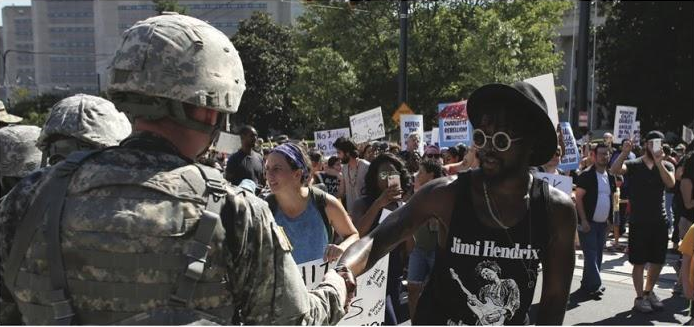
In the middle of September this year, two more names were added to the long list of black men on the receiving end of bullets fired by men and women in uniform. The gunshots punctuated not just the lives of Terence Crutcher, 40, and Keith Scott, 43, but also two of the most pressing questions to ever challenge the greatness of our nation: “Why does the preventable shooting of black Americans by officers of the law continue to happen at such a high rate?” and “How can we stop it as quickly as possible?”
Every American is brought face-to-face with these two questions in our social media era. Many citizens have taken to the streets in Charlotte and Tulsa since the shootings to decry the premise of the first and attempt to finally resolve the second. Others denounce the protests as unpatriotic, disrespectful or even causing future conflicts. Still others distance themselves from the events, avoiding both discussion and action.
However, the winding branches of systemic racism endemic to our country bear two bitter truths: First, that we are all involved, and second, that it will take an active effort on behalf of all citizens, privileged and unprivileged, for changes to be made.
The existence of widespread implicit racism in America has been documented extensively by resources such as the Harvard Implicit Association Test. Those who remain silent despite acknowledgment, however uncomfortable, of the force of implicit bias, are a major part of the problem. When one considers the incredible amount of violence resulting from racism in the United States, such a position becomes indefensible.
The opposition of many citizens to protests is elevated by the media’s poor handling of recent drama. Reports of protests following the shootings have been greatly exaggerated. As a Charlotte native, I saw a great deal of news unfold on Facebook. Many of my friends attended various demonstrations. Almost all expressed that media reports of violence and aggression, which underscored moments of violence and discord, were not representative of the overall scene across the city.
While demonstrations got regrettably out-of-hand in several cases, resulting in injured policemen and a crowd fatality, it is important to note that on the whole, the protesters and policemen remained respectful of the rights and safety of everyone involved. One of my friends, a black Charlotte native and the daughter of a policeman, was recently profiled in the media. She said that, for the most part, the police allowed the protesters a reasonable amount of space and activity, and demonstrators in turn abstained from violence. She also described how the media’s portrayal of the situation makes it feel like an “us-vs-them” issue, an assertion which is both deleterious and inaccurate.
Protesting is an essential tool for resolving social conflict, and, when done in a safe and respectful manner, it need not be dangerous. Civil disobedience is the expressive right of the oppressed; violence will be eliminated as respect is established between demonstrators and the police. Here, the responsibility of the media to avoid divisive language cannot be understated. Also required is the unification of our citizenry in a positive, productive and purposeful commitment to dispelling the underlying racism which has made these tragic shootings commonplace.
I believe that this commitment is a moral obligation. It can be as simple as checking in on friends affected by recent events, as uncomfortable as confronting people passionate about opinions you find fault with, or as bold as participating in protests. No matter the chosen path, active involvement in the issues facing a nation is the implicit duty of all its members.
